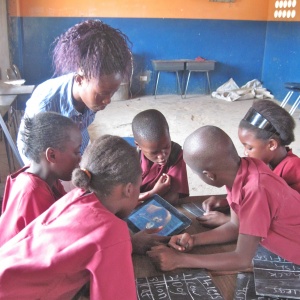OER4Schools/Typing practice with students: Difference between revisions
No edit summary |
No edit summary |
||
| (2 intermediate revisions by the same user not shown) | |||
| Line 12: | Line 12: | ||
Activity: | Activity: | ||
* Students do typing | * Students do typing practise (individually). | ||
* If there are not enough keyboards for each student to have one, you do carousel-style group work. You can combine developing typing skills with any other activity that requires individual or small group work. | * If there are not enough keyboards for each student to have one, you do carousel-style group work. You can combine developing typing skills with any other activity that requires individual or small group work. | ||
* Make sure you plan your lesson so that every student has got a chance to | * Make sure you plan your lesson so that every student has got a chance to practise | ||
* Use a typing tutor | * Use a typing tutor | ||
* Students can record their scores to see how they improve over time, or to form a league table. | * Students can record their scores to see how they improve over time, or to form a league table. | ||
'''Typing practice in the classroom.''' You only have a limited number | '''Typing practice in the classroom.''' You only have a limited number | ||
of computers. When you start typing | of computers. When you start typing, you can do this in | ||
pairs, so that both students understand how the typing tutor program | pairs, so that both students understand how the typing tutor program | ||
works. However, once students get this, it makes sense to do it as an | works. However, once students get this, it makes sense to do it as an | ||
individual activity. However, students only needs to | individual activity. However, students only needs to practise for 10 | ||
minutes. Say if you have 12 netbooks, then take a group of 12 students | minutes. Say if you have 12 netbooks, then take a group of 12 students | ||
to do typing | to do typing practise, while your remaining students (perhaps 20-30 or | ||
so) do other tasks (also in group work). After a while, you rotate: | so) do other tasks (also in group work). After a while, you rotate: | ||
Some of the students who were doing other tasks now use the typing | Some of the students who were doing other tasks now use the typing | ||
Latest revision as of 12:34, 19 November 2013
| Resource details | |
| Title | Typing practice with students |
| Topic | |
| Teaching approach | |
| Learning Objectives | |
| Format / structure | |
| Subject | |
| Age of students / grade | |
| Table of contents | |
| Additional Resources/material needed | |
| Useful information | |
| Related ORBIT Wiki Resources | |
| Other (e.g. time frame) | |
| Files and resources to view and download | |
| Acknowledgement | This resource is part of the OER4Schools programme. |
| License | |
This activity would follow on from the basic netbook familiarisation.
Key points:
- Some computer use relies on conceptual understanding (such as understanding the terms "application", "window" etc). Student need practical experience, but the main concepts are understood conceptually.
- There are other skills in computer use, which are motor skills (such as using the mouse and typing) that are need to be learned through repetition.
Activity:
- Students do typing practise (individually).
- If there are not enough keyboards for each student to have one, you do carousel-style group work. You can combine developing typing skills with any other activity that requires individual or small group work.
- Make sure you plan your lesson so that every student has got a chance to practise
- Use a typing tutor
- Students can record their scores to see how they improve over time, or to form a league table.
Typing practice in the classroom. You only have a limited number of computers. When you start typing, you can do this in pairs, so that both students understand how the typing tutor program works. However, once students get this, it makes sense to do it as an individual activity. However, students only needs to practise for 10 minutes. Say if you have 12 netbooks, then take a group of 12 students to do typing practise, while your remaining students (perhaps 20-30 or so) do other tasks (also in group work). After a while, you rotate: Some of the students who were doing other tasks now use the typing tutor, while the students previously doing the typing tutor now join in with other group tasks. We will introduce carousel(a)-style group work properly in session 3.2.

